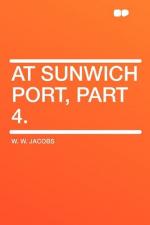“There’s always Sam Wilks’s cottage,” he said, in a husky whisper; “and if two of ’is friends should ’appen to meet there, who’d be the wiser?”
He gazed benevolently after the young man’s retreating figure and continued his stroll, his own troubles partly forgotten in the desire to assist his friends. It would be a notable feat for the humble steward to be the means of bringing the young people together and thereby bringing to an end the feud of a dozen years. He pictured himself eventually as the trusted friend and adviser of both families, and in one daring flight of fancy saw himself hobnobbing with the two captains over pipes and whisky.
Neatly dressed and carrying a small offering of wallflowers, he set out that afternoon to call on his old master, giving, as he walked, the last touches to a little speech of welcome which he had prepared during dinner. It was a happy effort, albeit a trifle laboured, but Captain Nugent’s speech, the inspiration of the moment, gave it no chance.
He started the moment the bowing Mr. Wilks entered the room, his voice rising gradually from low, bitter tones to a hurricane note which Bella. could hear in the kitchen without even leaving her chair. Mr. Wilks stood dazed and speechless before him, holding the wallflowers in one hand and his cap in the other. In this attitude he listened to a description of his character drawn with the loving skill of an artist whose whole heart was in his work, and who seemed never tired of filling in details.
“If you ever have the hardihood to come to my house again,” he concluded, “I’ll break every bone in your misshapen body. Get!”
Mr. Wilks turned and groped his way to the door. Then he went a little way back with some idea of defending himself, but the door of the room was slammed in his face. He walked slowly down the path to the road and stood there for some time in helpless bewilderment. In all his sixty years of life his feelings had never been so outraged. His cap was still in his hand, and, with a helpless gesture, he put it on and scattered his floral offering in the road. Then he made a bee-line for the Two Schooners.
Though convivial by nature and ever free with his money, he sat there drinking alone in silent misery. Men came and went, but he still sat there noting with mournful pride the attention caused by his unusual bearing. To casual inquiries he shook his head; to more direct ones he only sighed heavily and applied himself to his liquor. Curiosity increased with numbers as the day wore on, and the steward, determined to be miserable, fought manfully against an ever-increasing cheerfulness due to the warming properties of the ale within.
“I ’ope you ain’t lost nobody, Sam?” said a discomfited inquirer at last.
Mr. Wilks shook his head.
“You look as though you’d lost a shilling and found a ha’penny,” pursued the other.




